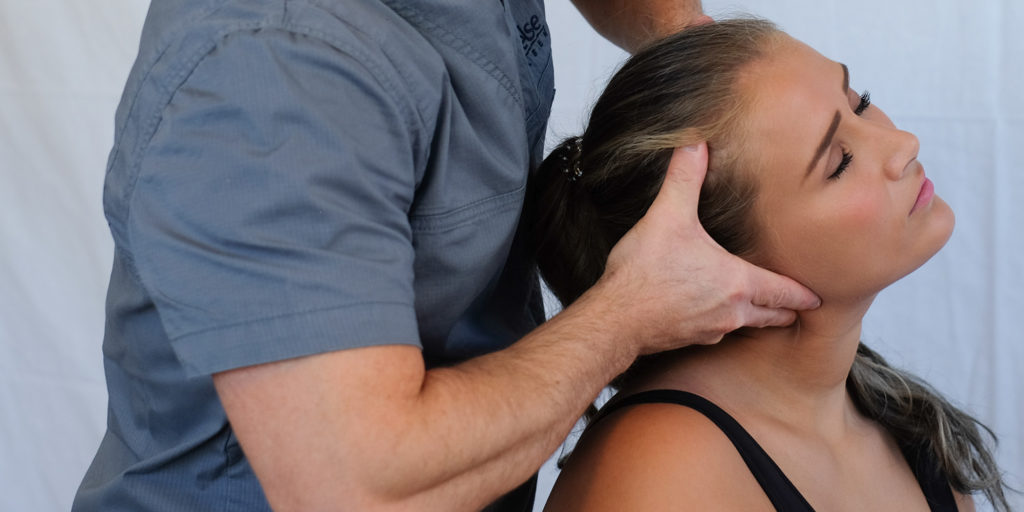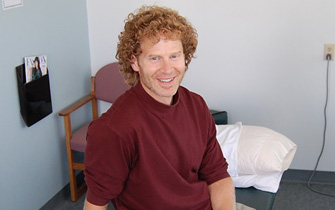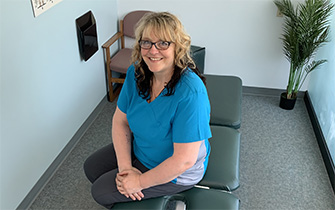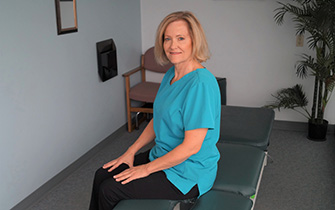Many of our clients see us because of injuries resulting from motor vehicle accidents (MVAs). Even minor car accidents can cause a number of health concerns, including whiplash, concussions, strains, or sprains. Getting treatment in a timely manner ensures your accident doesn’t result in life-long pain or injury.

Understanding motor vehicle accident injuries
Motor vehicle accidents can result in a wide range of injuries, each requiring specialized care to ensure a full and swift recovery. Recognizing and understanding these injuries is crucial in developing an effective treatment plan. Here are some common types of injuries sustained in motor vehicle accidents:
Most common types of MVA injuries
While every motor vehicle accident is different, we see a number of common injuries:
- Whiplash: this is one of the most common injuries resulting from car accidents, caused by the sudden back-and-forth motion of the neck and spine.
- Headaches and concussions: these are often caused by the violent movement of the head during the collision and can also be a result of the head hitting the inside of the car.
- Jaw pain or TMD: Temporomandibular joint disorder (TMD, commonly known as TMJ) can occur due to the impact of an accident, leading to jaw pain, difficulty chewing, and headaches.
- Back and spine pain: injuries involving the muscles or ligaments, or herniated discs or fractures to the upper, middle or lower back can be suffered which can cause significant pain and mobility issues, requiring targeted treatment.
- Shoulder, neck, and arm pain: injuries to the shoulder and arm caused by muscles being pulled, such as a rotator cuff strain or ligaments being overstretched are common and can severely limit the range of motion of the neck and shoulder, and make daily activities difficult and painful.
- Leg pain: sprain and strain injuries to the hip, knee, ankles and feet are also common in motor vehicle accidents.
- Vertigo: or a sensation of dizziness, can be a result of head or neck injuries sustained in an accident.
Symptoms to watch for after a motor vehicle accident
Physical symptoms:
- Neck or shoulder pain/stiffness
- Lower or upper back pain/stiffness
- Headaches
- Numbness or tingling usually in arms and/or legs
- Bruising
- Tenderness throughout the neck and back
- Jaw pain, clicking and reduced opening
Cognitive and emotional symptoms:
- Confusion or disorientation immediately after the accident
- Memory issues
- Mood swings
Other symptoms:
- Fatigue or drowsiness
- Dizziness or vertigo
- Vision issues
- Ringing in ears
The importance of early intervention
Early intervention after a motor vehicle accident is crucial for a successful recovery. Addressing injuries promptly can prevent chronic pain, improve healing times, and reduce the risk of long-term complications.
At Summit Physiotherapy & Massage we offer targeted treatments that alleviate pain, restore mobility, and strengthen affected areas, enabling you to return to your daily activities sooner. Don’t delay — early physiotherapy can significantly improve your overall recovery and quality of life.
Benefits of seeing a physiotherapist after a car accident
Seeing a physiotherapist to treat injuries from motor vehicle accidents is extremely beneficial. Our holistic approach focuses on understanding your injury and creating a custom treatment plan to get you feeling better faster. Our goal is to improve your level of activity, reduce your pain and educate you on how to manage your symptoms and avoid re-injury.
The benefits of physiotherapy to treat injuries from MVAs include:
- Supports faster recovery
- Alleviates pain
- Prevents long-term issues
- Improves strength and flexibility
- Reduces tension and tightness in the muscles
Our approach to motor vehicle accident physiotherapy
When you visit us after a motor vehicle accident, our physiotherapists will work with you to determine what tissues have been injured and are causing your symptoms. After a diagnosis, we’ll create a targeted and customized treatment plan to address those symptoms and the underlying injury to get you relief from pain and restore your full movement as quickly as possible.
If needed, we may refer you to your physician if we are concerned that the extent of your injuries requires diagnostic imaging or medication.
If you have a jaw injury or TMJD, we may also refer you to your dentist for further treatment.
Specialized MVA physiotherapy services for MVA injuries
Our ultimate goal with physiotherapy for motor vehicle accidents is to reduce your pain, restore your spinal movement, increase your flexibility and strength and help you fully return to your work and hobbies. This is achieved by reducing muscle and myofascial tension and adhesions, increasing the circulation, range of motion and strength of the affected muscles and restoring the normal movement patterns of the injured joints.
The following treatments are commonly used for treating injuries from motor vehicle accidents:
Education
We start by educating you on what your injuries are and giving you a prognosis on what the road to recovery looks like and how long it will possibly take. We also discuss how to manage the symptoms on your own and share which activities to avoid and which activities will help and not hamper your recovery.
Strengthening exercises
Depending on your injury type, we will show you exercises aimed at strengthening muscles that are injured and weak in order to increase muscular support to injured areas and joints.
Stretching program
To help reduce muscle tension and increase the range of motion of affected areas, we create a custom stretching program appropriate for your injury.
Vertebral/Joint mobilization
Vertebral or joint mobilization increases the mobility and flexibility of joints. Joints can become stiff and sore after an accident and need to be stretched and mobilized to regain their normal amount of movement.
Intramuscular stimulation (IMS)
Intramuscular stimulation (IMS) therapy involves inserting thin needles (like those used in acupuncture) into muscles that are causing pain. This calms the nerves and relaxes tight muscles.
KT tape/Kinesio taping/Neuroproprioceptive tape
This technique helps to reduce muscle tension and promote proper muscle coordination.
Ultrasound and TENS (Transcutaneous Electrical Nerve Stimulation)
Ultrasound and TENS can be helpful if the condition is too acute or too sensitive to do much manual work. They help to increase circulation and reduce inflammation, thereby reducing pain.
Acupuncture
Acupuncture is an ancient practice that involves inserting fine needles into specific points on the body to stimulate healing and pain relief. It is a valuable complementary therapy to reduce pain, alleviate stress, and enhance overall recovery.
Massage Therapy
Techniques such as deep tissue and Swedish massage help alleviate muscle tension, enhance blood circulation, and reduce pain. Regular massages also promote relaxation, relieve stress and anxiety, and support both physical and emotional healing.
Myofascial Release
Myofascial Release targets the connective tissues, or fascia, that can become tight after an accident. This technique uses gentle pressure to release tension and restore movement. It’s particularly helpful for those dealing with chronic pain or stiffness that doesn’t improve with other treatments.
Craniosacral therapy
Craniosacral therapy is a gentle, hands-on treatment that helps alleviate pain from injuries such as whiplash, headaches, and neck tension by gently restoring the body’s natural rhythms. This treatment supports the healing of both physical and emotional trauma, providing a soothing and effective approach to recovery.
TMJ physiotherapy treatment
TMJ Physiotherapy Treatment is ideal for those experiencing jaw pain after a motor vehicle accident. This therapy focuses on easing tension in the jaw, reducing pain, and improving jaw movement. It also helps with related issues like headaches and neck pain, supporting a smoother recovery.
Shockwave therapy
Shockwave therapy uses a pneumatic generator to deliver high-powered sound waves that effectively treat issues like tendinitis. This non-invasive treatment helps reduce pain and promote healing in damaged tissues.
Chronic pain management
Chronic pain treatment focuses on providing long-term relief for persistent pain following a motor vehicle accident. This approach combines various therapies to reduce pain, improve mobility, and enhance your quality of life, helping you manage ongoing discomfort effectively.
Ready to start feeling better? Contact us today for more information about our motor vehicle accident physiotherapy.
Find Healing with Our Skilled MVA Treatment Professionals
Not sure which member of our team to work with? We can help! Contact our clinic today.
Frequently Asked Questions
When should I start physiotherapy after an accident?
You should start physiotherapy as soon as possible after an accident. Most importantly, the sooner you begin treatment, the better your outcome. You’ll start feeling better sooner and can help avoid aggravating your injury further.
Secondly, to be fully covered and in order to take full advantage of your automobile insurance policy in Alberta, you’ll need to be assessed by a health care practitioner within 10 days of the accident.
Do I need a referral from my doctor or insurance to book an appointment?
You do not need a referral from your doctor or insurance company to book an appointment with us for injuries due to a motor vehicle accident. We can help you navigate the rules around insurance and fill out the necessary forms.
Book your appointment online today or by phone at (780) 459-1066.
Do I have to go to the place my insurance recommends?
No, you do not have to go to the clinic(s) recommended by your insurance company. In fact, we suggest you choose another clinic. Insurance company’s “preferred providers” may be incentivized to keep costs low for the insurance company so that they continue to receive those referrals. That means they may be less likely to recommend further treatment — even if you need it.
What can I expect to happen at my first physiotherapy appointment after a car accident?
At your first physiotherapy appointment after a car accident, you can expect the following process:
- We’ll discuss your accident, your symptoms and the impact these injuries are having on your work and daily living
- We’ll talk about any other concerns and go through your medical history
- We’ll complete a physical exam to determine the type and extent of your injuries
- We’ll start by providing some education on how to avoid aggravating your injury (guiding you on what activities to continue/stop, what adjustments you should make to your routine, etc.),
- We’ll show you how to do appropriate exercises/stretches
- Depending on the stage of healing, we may do manual therapy, electro-modality application, kinesio taping, acupuncture, IMS or apply heat or ice
What is MVA Rehabilitation?
Motor vehicle rehabilitation involves treatments aimed at reducing pain, healing injuries caused by the accident, and getting you back to your pre-accident self. This can be done through physiotherapy, massage, IMS, cupping, exercise/stretches, and more.
How long does it take for muscles to heal after a car accident?
It can take 6-8 weeks for muscles to heal after a car accident but may take longer. Often it’s the nerves that continue to be irritated that lead to the muscles continuing to be tight.
Other injuries can take longer to heal (ligaments getting overstretched and not tightening can lead to instability; continued muscle weakness; disc injuries are all examples) which can also cause the muscles to continue to be tight, causing pain and stiffness.
Ready to book an appointment?
Our physiotherapists and massage therapists have extensive experience treating injuries caused by motor vehicle accidents. Starting treatment today is the best way to promote faster healing, reduce the pain from your symptoms, and get you on the right track towards recovery.







